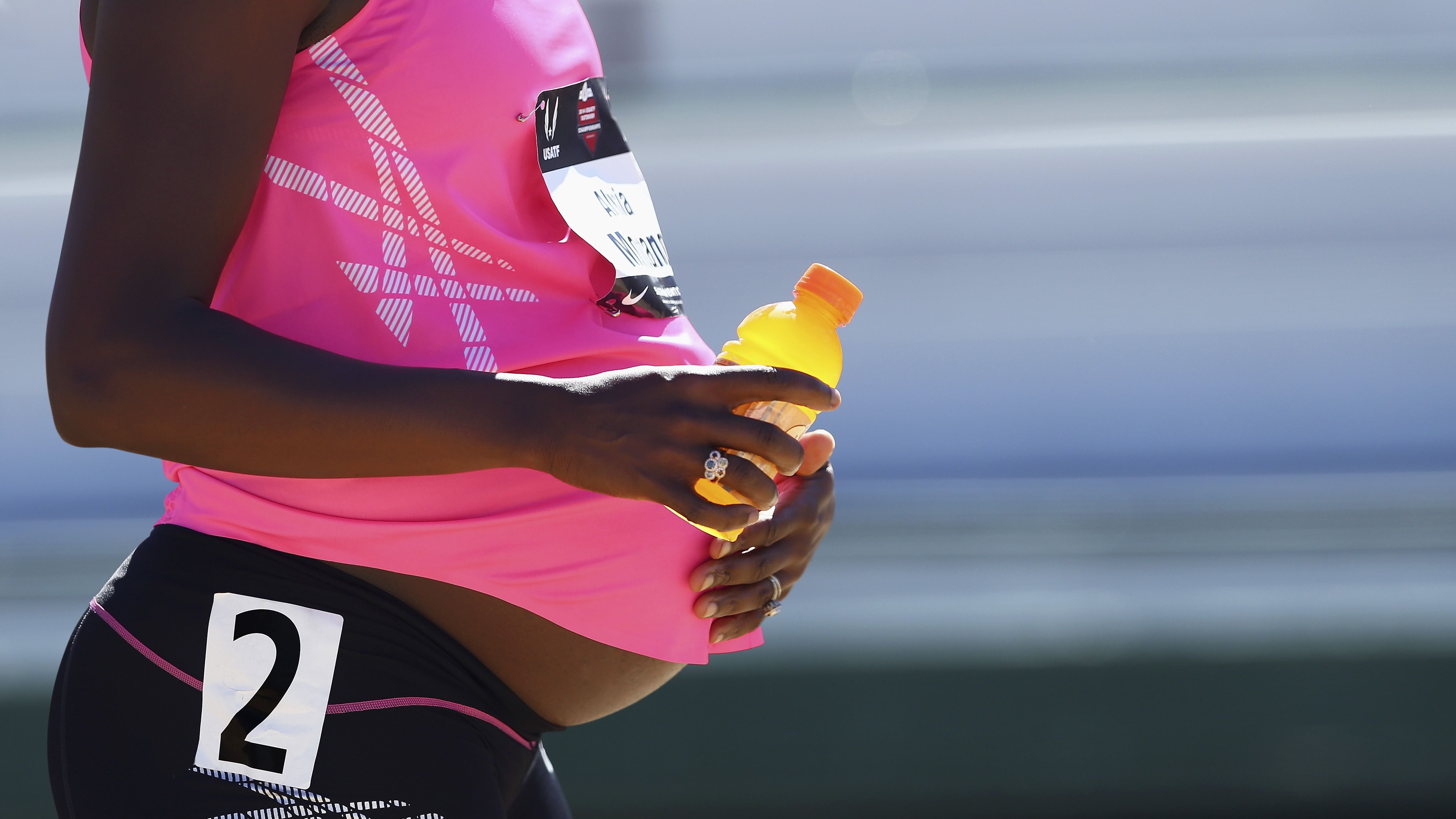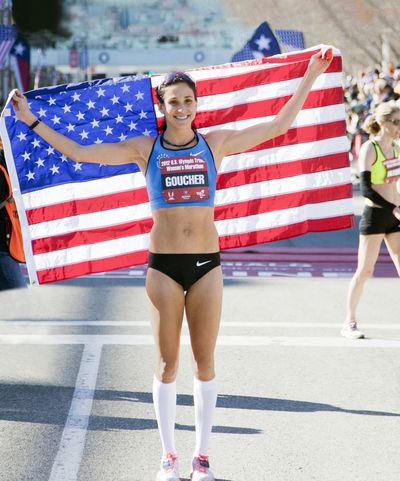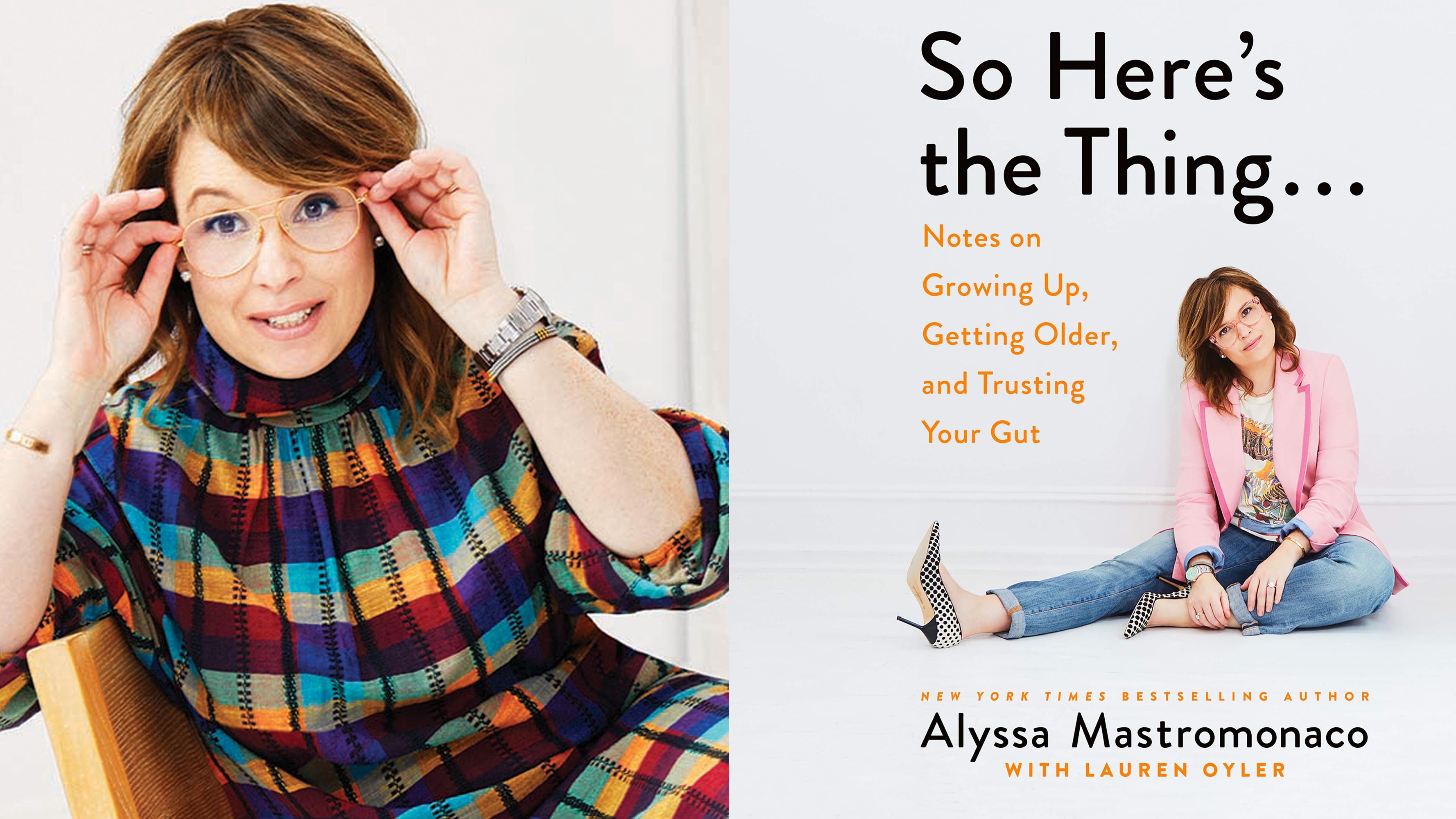What Happens When You're an Elite Athlete—and You Get Pregnant?
Three track-and-field stars sparked a movement by going public about the lack of maternity leave in sports. As Nike announces big changes to their contracts and the push for paid leave gains traction nationwide, the women tell us how they’ll keep fighting.


In May, six-time U.S. champion middle-distance runner Alysia Montaño and world-champion marathoner Kara Goucher broke nondisclosure agreements to reveal, in a powerful New York Times op-ed, how Nike and other sports companies penalize many of their sponsored athletes who become pregnant by cutting their pay until they return to competition. Six-time Olympic gold-medalist sprinter Allyson Felix followed with her own column the next week, divulging that her contract-renewal negotiations were at a standstill because Nike refused to guarantee she wouldn’t be docked for not performing at her best in the months surrounding childbirth.
Both pieces sent shock waves around the country, sparking a conversation about the need for paid leave nationwide. In July, Felix announced she was signing with Athleta, instead, as the athleisure company’s first sponsored athlete. Bowing to pressure, yesterday Nike announced it would no longer financially penalize pregnant runners; it will now guarantee an athlete’s pay and bonuses cannot be docked for 18 months (8 months before the due date, 10 months after the birth). Other companies have made similar statements: Asics, which Montaño also called out for reducing her pay postpartum, Under Armour, and New Balance affirmed their commitment to supporting athletes during and after pregnancy; Brooks said it would improve its policies to do the same.
Here, the trio of runners discuss the latest news from Nike (spoiler: they’re not unanimously pleased), how they’re setting a precedent for the next generation, and why having paid time off to welcome a new baby matters.
Marie Claire: How aware were you about Nike’s policy when you signed the contract?

Kara Goucher after qualifying for the 2012 Olympic team.'
Alysia Montaño: Most professional athletes sign contracts between the ages of 18 and 22, so having a baby isn’t the first thing on your mind. I imagined there would be a way to intertwine your milestones because that’s what life is about. I thought that’s what a sponsorship would look like, not, “You are deciding to have a child so you’re of no value to us.” Later on, when I asked what would happen if I got pregnant, the answer was a very casual, “Oh, we’ll just pause your contract and stop paying you until you return.” I was shocked and when my contract ended I thought, I have got to get out of here.
Kara Goucher: I signed my first contract in 2001 when I was 22. My fiancé, now husband, was with me and he asked, “What happens when she wants to have a baby?” in a room full of men. I wanted to die and I was giving him side-eye like, Please stop talking! I remember thinking, Oh my God, like, why are you saying that? They're going to think I'm not serious. They said they don’t address that in the contracts and it was on a case-by-case basis. Then they made a joke about me not starting a family any time soon and I was like, “No! Not anytime soon!”
MC: What happened when you got pregnant?
Get exclusive access to fashion and beauty trends, hot-off-the-press celebrity news, and more.
AM: After leaving Nike, at Asics, I became pregnant with my daughter. There was a woman working with my contract at the time and she was great. I hesitated to tell her, but when I finally called she said, “I hope you’re not calling me because you’re worried about your contract.” So we had an understanding. But she left the company after I had my daughter, and her replacements (two men), came in and said, “We’re cutting your contract based on your performance in 2014,” [the year I was pregnant]. My eyes welled up; I had had verbal assurance from one person, but once that role changed hands, I no longer had value as an athlete because I had a baby.
I no longer had value as an athlete because I had a baby.
KG: My coach said, “Just make sure you stay relevant and do what they ask.” So I did. I made around 20 appearances, I was traveling like crazy. I remember my agent saying, “You’re the busiest pregnant person we’ve ever met.” Then, two months before I gave birth, my financial advisor called and said my quarterly payment hadn’t come through. When I called to find out what happened, I was told I was suspended indefinitely, and my pay would resume once I returned to competitions. There was no conversation, no warning; I just didn’t get paid even though I was doing everything they asked of me. If I had known I wasn’t going to be paid, I wouldn’t have made all of those appearances—I would have visited my family and enjoyed my pregnancy.
MC: Kara, when your son was three months old, he had an emergency surgery and you had to leave him in the hospital to go running. Tell us about that decision.
KG: I felt like I had no choice. Looking back, I wish I had said, “Fuck you.” But I was the sole income provider for our family at that time and I felt so much pressured to get back to competing. You are being held hostage in the situation you’re in.
MC: Allyson, why were your negotiations with Nike prolonged?
AF: You can't go off of the promise and the hope that a company is going to do the right thing—you need it in writing. I don’t even plan to have more kids, but I’m fighting to set a precedent. I waited until the end of my career to start a family. Maybe I would have made that decision anyway, but I think women should have the option to be supported—to come back to running—if they would like to start a family earlier. It’s really about holding them accountable for those who come after me.

Allyson Felix at the 2016 Summer Olympics in Rio, where she won two gold medals.
MC: Why did you decide to leave for Athleta?
AF: Athleta is redefining what sponsorship looks like for female athletes. When I met with the team, there was an immediate connection of values, which is something I’ve never experienced before. They're champions of women and girls. They’re truly invested in me as more than just an athlete—but as a woman, a mother, and an activist. I am really looking forward to what we can create together.
MC: How much do athletes talk about the lack of paid leave behind the scenes?
AM: The private conversations definitely happen, but after I had my daughter, a large number of female athletes came to me and said they wanted to have a baby and they thought it was so cool that I did. I was shocked. I didn’t think anyone wanted to have a kid—it just wasn’t happening. The culture was that no one had families unless they retired.
AF: It’s an unspoken thing. I know a bunch of women who have gotten pregnant and waited to tell their sponsors until they found a new deal or collected payment. It’s happens all the time.
KG: We all know it, we all think it’s unfair, but we feel helpless. When I had my son, women came up to me and said, “I got reduced, but Nike supported you.” And when I said, “no, they didn’t,” their minds were blown.
You are being held hostage in the situation you’re in.
MC: Were you nervous about breaking the silence?
AF: Definitely. I’m not really the kind of person to shake things up—it’s not in my nature. So it was outside of my comfort zone and felt like a risky move, but having my daughter made me feel like this is bigger than myself and I felt I couldn’t stay silent anymore.
KG: I barely slept the night before the article came out. You're dealing with a very powerful company and the fear of retribution is big. I told The New York Times, if Nike sues me, you need to print that; I want that to be part of the story too. But I feel it is my responsibility to protect the next generation. I need to stick my neck out because part of what comes with my success is making sure that those same opportunities are there for other women. I'm 40 now and kind of a point where I’m just like, “I don't care anymore.” But younger women can't do that—they don't have the luxury. They’re young, they're starting their careers, they don't have the ability to push back yet because they're in that position that I was in when I was 22 where you're just supposed to be grateful for what you get.
AM: I was worried they were going to come after me and I don’t have any money to be sued. But how enslaving is it to be treated so inhumanly and to have it in your contract that you can’t speak about it—you can’t talk about anything covered in the contract, even about things [like paid leave] that aren’t mentioned in it. So yeah, it’s scary, but nothing changes with silence and if I’m a martyr for it, it’s not ideal, but at the end of the day, this is for our daughters and our sons.
MC: How did having a baby changed how people in sports viewed you?
KG: They told me I was family, and I thought I was family. But when I was pregnant, I was looked at as not serious anymore. You’re just pushed aside, even though you still want your career just as badly. Your life just has more layers to it now.
AM: I felt like I couldn’t continue my career—like having a family was a dead end. I’m not saying I expected people to just hand me a contract, but I was an Olympian and a national champion and there was no reason [a company wouldn’t sign me] besides the fact that I had a child.

Alysia Montaño running six weeks before giving birth to her daughter.
MC: How does the continued male dominance in sports, especially in leadership and on the business side, impact all of this?
AF: You negotiate with a team of all men and pregnancy is something men aren’t always going to understand, so having the perspective of a woman would be very beneficial. Representation matters.
KG: There needs to be more women in charge. They need that female voice because men can’t possibly comprehend that you can have a baby and come back to your job. Maybe if there was a woman in sports marketing she could say, “Actually guys, I have two children and I’m here doing the same job as you, so it can be done.”
AM: Or she could pop in and say, “It’d be great if we didn’t equate pregnancy and injury.”
MC: How do you feel about companies preaching female empowerment while not taking care of their women employees?
KG: Nike’s advertising is amazing. I get chills when I watch their videos, but I have to say to myself, Remember when you got pregnant and they just stopped paying you? That’s the same company! Nike promoted me during my pregnancy—it was selling this image of motherhood—while causing me so much stress. If you want to support female athletes, then you have to support them in all aspects of life.
AM: I ran pregnant and it looked like Asics celebrated me, but the background conversation was nothing like that at all.
MC: Tell me about the toll rushing back to racing took on your body?
KG: It definitely took a huge toll on me physically. The day I gave birth, I ran for 50 minutes and lifted weights. Five months after my son was born, I ran a half marathon. At six months, I ran the Boston Marathon. Nine months out, I qualified for the World Championships. Then I got a stress fracture because it was too much.
Pushing myself like that definitely shortened my elite career, but once I stopped getting paid, I knew I was going to have to return quickly. I ran 120 miles a week while nursing, and I had a breakdown in my doctor's office. She said, “You cannot do this. This is too much stress on your body.” But instead of saying to Nike, “I can't run this marathon that you guys want me to run,” I chose to stop nursing my son, which I now regret, but that’s the choice I felt I had to make.
Today, I have chronic hip issues because I kept getting stress fractures as a result of rushing back when my body wasn't healed. If I had just been given eight months to heal, maybe I’d be fighting to go to the Olympics next year. Instead, I still run a lot, but I run for myself now.
The new clause they published does nothing to protect women from a suspension.
MC: Why does having paid leave matter?
AF: It takes time to adjust. You also don't know what kind of birth you are going have to have. Mine was a complicated ordeal. There was a lot of recovery time, a lot of time spent in the NICU. I never imagined that that would be my situation, but it was, and it affected my ability to train. If you don’t have that stress of feeling like I have to get back ASAP—I’ve got to do everything I can, it allows you to be healthier all around. When you support a woman and her family, you get a more complete athlete who is able to come back stronger and that’s better for everyone.
MC: What does a lack of paid leave in the U.S. say to you about the way we value mothers?
KG: We punish women for wanting to have children, which is so ironic because none of us would be here if a woman didn’t bring us into the world. Not offering protections is so shortsighted. We’re holding women back from having success in the workplace and at home. So much of the time, it's like you're given a choice: You can have that baby or you lose your job.
AM: It’s baffling to me how much we undervalue families and what actually makes an economy go ‘round. What company are you building and for whom? Who is going to be paying for what you sell when there’s no more babies? I’ve spoken to so many women who said, “I wish I would have been able to start a family sooner, but I was just so focused on my career.” I want women to have the option because I have a brain and a uterus and they both work.
MC: What is your reaction to the news that Nike will now guarantee pregnant athletes’ pay will not be docked for 18 months?
AF: I am super grateful to John Slusher [Nike’s EVP of Global Sports Marketing] and Mark Parker [the company’s President, Chairman, and CEO] for their leadership and their desire to guide Nike as a company who believes that we, woman, are all more than athletes. I am thankful to the brands who have already made this commitment and look forward to see others come forward and make the change too.
KG: I did see the announcement about not reducing athletes pay for a specific amount of time during and after pregnancy. However, I and the other athletes I know of, were suspended without pay by Nike during our pregnancies and until we returned to competition. The new clause they published does nothing to protect women from a suspension. In fact, I have spoken to eight other female athletes who were sponsored by Nike while pregnant, and none of them were given [pay] reductions: They were all given suspensions without pay. As was my case, Nike stopped paying them when they found out about the pregnancy until after they returned to competition. For some women, this meant going over 18 months without pay, yet legally they could not find work elsewhere because they were technically contracted by Nike. While I acknowledge this new amendment Nike has put out, it does not address the concerns of the extremely unethical suspensions that we women faced.
Interviews were conducted separately in June and August and condensed and edited for clarity.
This article appears in the September 2019 issue of Marie Claire.
RELATED STORY

Kayla Webley Adler is the Deputy Editor of ELLE magazine. She edits cover stories, profiles, and narrative features on politics, culture, crime, and social trends. Previously, she worked as the Features Director at Marie Claire magazine and as a Staff Writer at TIME magazine.
